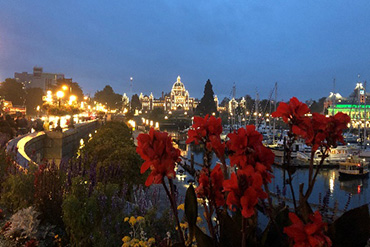Students wishing to study abroad from Akita University
Reports on study abroad experiences
University of Victoria
(Canada)
AY2019
Short-term overseas study program
Yoshitomo Nunozawa
2nd year,
Faculty of Engineering Science
University of Victoria
(Canada)
Short-term overseas study program
What I learned through the program
The content of my study at the University of Victoria was learning how to express myself in daily conversation in various situations, and practicing that training and speech. Among other things, there were many words and situations that cannot be easily expressed in Japanese, but I learned how to express them. By doing so, I was able to feel some of the unique language culture of English. I also learned about expression and interpretation through drama, and how to interpret and express music pieces. In addition, I also studied in the library on campus. The library had a nice atmosphere and I used it to do my assignments and review after class. There were many interesting books in the library, and if I had had more time, I would have liked to have read more books in diverse fields.My life during the program
My host family were kind and cheerful people. I enjoyed talking with my host family every day and we discussed Japanese culture using gestures. I also became good friends with my host family’s son, a high school student, and we went shopping together, played billiards, and studied English and Japanese together. My host family’s son was very fond of Japan and Japanese language, and he knew a lot about Japanese anime, games and history. I could only listen passively to him because I don’t watch anime or play games at all, but I talked about famous places in Japan with him. I happened to be living in Nara and Kyoto, so we talked about temples and shrines. I also climbed Mt. Fuji, so we talked about that. He was also a very good billiards player, and we played against each other many times, but I could only win once, so he gave me some technical guidance, which is now a fun memory. The time we spent teaching each other English and Japanese was very meaningful and valuable. I taught him simple Japanese for about an hour, and then he taught me English. I had a lot of trouble with the nuances of the language, but now I think it was a good experience for me.For meals, I prepared my own cereal in the morning and ate lunch at the food court on campus, or I made sandwiches at home the night before and brought them with me. For dinner, I either ate with my host family or went downtown with my friends to eat at a restaurant.
On weekends and holidays when I didn’t have classes, I used one card provided by the University of Victoria to take the free bus to visit various places. There were many activities and I climbed mountains, visited castles, and walked along the beautiful coast.






